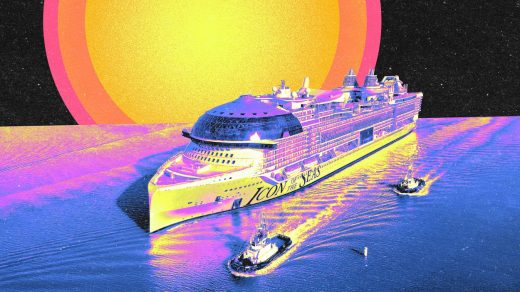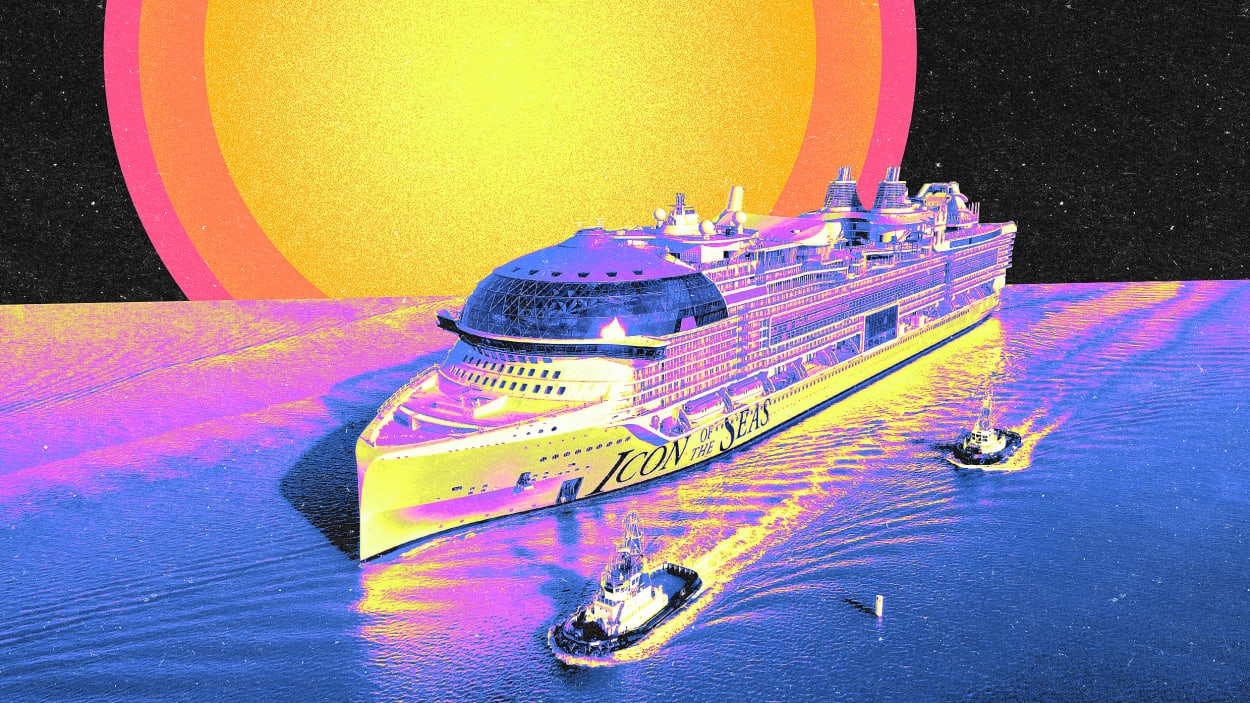With Royal Caribbean’s new megaship, we have reached peak cruise
Branded is a weekly column devoted to the intersection of marketing, business, design, and culture.
Just over three years since a global pandemic basically brought the entire leisure-travel industry to an abrupt halt, we seem to have reached a surprising destination: peak cruise.
Carnival, one of the leading brands in the cruise business, recently boasted as part of its latest quarterly earnings report that total bookings have reached an all-time high, and customer deposits totaled $7.2 billion, more than $1 billion over the previous record. Even before the summer season kicked in, occupancy rates were almost at pre-pandemic levels and looked poised to surpass them. Carnival called the quarter an “inflection point” for the cruise industry in general.
And indeed, it’s not just Carnival. Primary rivals Royal Caribbean and Norwegian are also reporting sky-high occupancy rates—sometimes resulting in overbooking and reports of strained on-board staff and services on cruiser-packed vessels. In fact, the three cruise giants were the second quarter’s top-performing S&P 500 stocks. And Royal Caribbean, as it happens, recently completed construction of what it says is the world’s largest cruise ship: the approximately 1,200-foot, 276,000-ton Icon of the Seas, whose amenities include seven swimming pools and a full water park. Accommodating 5,610 passengers (and 2,350 crew), it’s set to sail in January, but advance bookings have already made it “literally the best-performing new product launch we’ve ever had,” the company claims.
This is all the more remarkable because the damage endured by the cruise industry at the height of COVID-19 was truly severe. Outbreaks on Carnival-owned vessels became unfortunate symbols of how not to manage contagion, and the Centers for Disease Control and Prevention slammed the cruise industry in general for practices that spread the virus. Massive fleets were forced to idle for months, maintained by burning through mountains of cash. Share prices across the category, understandably, had sunk.
But even when the cruise industry seemed decisively adrift, there were always those who spied hope on the horizon—and not just the cruise brands, but their customers. Cruise bookings, albeit made with an eye toward a better future, persisted throughout the depths of the pandemic crisis. One survey in the summer of 2020, when cruises were effectively banned, found that 76% of cruise fans were ready to sail. This wasn’t enough to offset billions in losses, but it was a beacon of sorts.
Of course, the broader travel zeitgeist has changed radically since then, as the virus has receded, and months or years of staying put translated into an intense desire to get outta town and have new experiences again—a phenomenon that’s been called “revenge travel.” Americans are heading to Europe in record numbers this summer, for instance. The CEO of Delta has said the airline calculated the total supply of travel spending that went unfulfilled thanks to the pandemic was “$300 billion—with a B.” That’s resulted in jacked-up prices across the hospitality business—and a percentage of consumers who are willing to pay up, anyway.
It’s plausible that the cruise industry has a particular niche in that phenomenon: For fans of the form, and those curious about it, it’s in a different category than traveling to see relatives on a holiday. Instead, it’s a pure-pleasure indulgence, and a memory-making adventure. Lots of people have had lots of time to revise and extend their personal bucket lists in the past three years, and it’s easy to imagine how that could work in the favor of finally taking that cruise you’ve daydreamed about for years.
In fact, hopes for the cruise comeback have, somewhat incredibly, shifted so far from the pessimistic scenarios of just two or three years ago that even gangbuster results aren’t enough for some on Wall Street. Carnival is widely expected to return to profitability after this summer travel season, but its shares fell after that last earnings release, despite beating expectations . . . apparently because some guessed it might be back in the black already.
But the share price recovered (and then some) within days, and ultimately the cruising giants’ brands appear to be shipshape. And really, that’s remarkable for reasons beyond the pandemic setback because the cruise business has other image challenges to overcome. Notably, even as it promises to carry passengers into a variety of wild blue yonders, it’s not exactly an eco-friendly business. Although the industry has pledged to reduce emissions 40% by 2030, one cruise ship alone can emit carbon on the scale of 12,000 cars.
And there’s just something flat-out decadent about the industry’s increasingly grandiose vessels. There was a flurry of controversy not long ago about Jeff Bezos’ superyacht (and the superyacht phenomenon in general) as a symbol of new-gilded-age excess run amok. But at 417 feet, Bezos’ $500 million Koru vessel is less than half the size of Royal Caribbean’s Icon of the Sea. Admittedly, passengers on the latter have to share amenities with more people than lived in the town where I grew up, but still: 20 decks, a record-setting 6 waterslides in its onboard water park, a 55-foot waterfall, and what is said to be Royal Caribbean’s first dueling-pianos bar. And prices reportedly start at (a promotionally discounted, and certainly not all-inclusive) just over $1,000 for seven nights. Surely, this is proof that the cruise business is offering us the people’s superyacht. The maiden voyage sold out in 24 hours.
The cruise business is always vulnerable—weather, contagion, geopolitical turmoil can all spoil or postpone your idyllic vacation. But the fact that, for better or worse, we have somehow found our way to peak cruise at this particular moment seems like definitive proof that for this business, the demand is there, and always will be. As long as there’s optimism, there will be people ready and willing to climb aboard.
(20)



